Meet Your Professors
Dr. Andrew arnold - constitutional & worker/Labor Studies
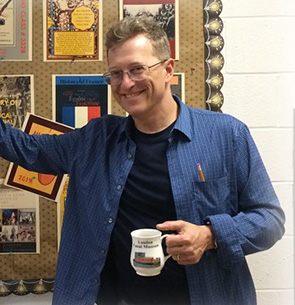
-
What makes the KU History Department special?
I think that one of the strengths of the history Department is that the professors teach very differently which allows the student to experience multiple ways of learning.
I think another strength is that students pick the classes that interest them. Our course selection is closer to that of a private school than to any other public school. We also teach special interest classes with topics such as the Crusades from the view of the Muslims, clandestine activities during the Cold War, and conspiracies in America.
-
Why are you so drawn to teaching the US Constitution?
Very few students understand it. I get to explain to them and have them learn something that's very complex and that is deeply relevant to their own lives. It's a dramatic, complicated story that students learn is important.
-
What approach do you take in helping students write more effectively?
I want to help students have less fear of writing. Help them to figure out what their method is, so that when they’re given an assignment they’re not paralyzed.
-
What’s your favorite memory of London while teaching study abroad classes there?
The single most interesting thing was going to the National Archives just outside of London.
They issue all the students an ID card with their picture on it that says, “Archives Scholar.” Then you look up anything you want to. We looked at Princess Elizabeth's letters. That's Princess Elizabeth before she became Queen Elizabeth. We unrolled proclamations from the 1600s and these little stamps about the size of your fingernail came flying off. These show that these scrolls had paid the stamp tax. We held letters that Ben Franklin wrote to the crown. They're in his handwriting; he wrote them, he held them, he folded them! In America, they'd be behind argon, or they would be microfilmed. So, you get to handle things of such antiquity and you get treated like a serious scholar. I had a student who held the account books for the Knights Templar from the 11th century and just the look on her face of like, “I'm holding this!” and she ended up studying Latin translation at the University of Kent probably because of that very experience.
-
How has working at a small college and living in the college town affected your life?
It's just enriched my life. My daughter calls the people I talk with my “professor posse.” When my wife and I use to do a weekly open house prior to Covid, it was a way of cementing relationships with neighbors and with people I work with here and their families. And, also to be a part of the community. I just like humans.
-
Why is it that you choose to walk everywhere?
I prefer it. Well, you know we live a few blocks from campus on purpose. I thought if I'm going to be part of our campus community then I want to be part of it. I do sometimes bump into students, and we talk about class or advisement or something. It's just I want to be part of the place. And often on the way to or from school, I'll bump into human beings that I know and like or don't know and introduce myself to. Yeah, I think it's more human.
-
How do you spend some of your leisure time?
I love hanging out with my kids. I read a lot. I like to cook. I bake bread. I like to learn new recipes. I love processing ideas with people I respect. My wife and I bought a camp up in rural Sullivan County. It's a primitive cabin and we don't own the land; we just own the cabin. I have been re-plumbing it and fixing it up and creating a winter water system, figuring out how to have running water in the cabin even when it's sub-zero weather. So, the history of plumbing became important in trying to figure out how to fix this cabin!
Dr. Eric Johnson - Early Modern Studies
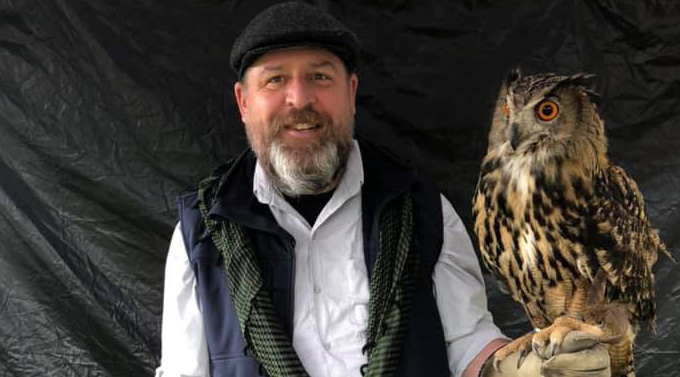
-
Q: What led you to teach?
“There was a major turning point when I was twenty where I had one of those epiphany moments. I had always wanted to get into law enforcement, but travel actually led me to teaching. My grandmother on my mother’s side was French, and she was also a French professor at a school in California. She kept insisting that I should visit her summer house in France. I was reluctant to visit and to step outside of my comfort bubble, but I eventually visited. I experienced so much while in France, and I wanted to learn more about it, and I wanted to go back. Ultimately, my travels led me to academia and teaching.”
-
Q: Why did you choose history as your field?
“I always had plans to eventually get a bachelor’s degree. Even wanting to get a career in law enforcement, my intention was to have a bachelor’s degree for it. That being said, I have always been interested in the past. As a kid, I thought I wanted to be an archeologist. I was most interested in European archeology, the European past, and especially the middle ages. I remember as a really small kid, my parents took me to the King Tutankhamun exhibit, and I was always obsessed with mummies, Egypt, and just old things in general. I realized that the best way for me to work with the material that I wanted to work with was to do history.”
-
Q: Did you have a previous career?
“My first job was in retail. I worked for a record store, and I was a manager there for almost a year. I didn’t like it because there wasn’t any reciprocity. It was a good lesson for me. I also volunteered as a Boy Scouts camp counselor and leader for six years. There were a lot of responsibilities. I helped run the camp. I guess that is what kind of formulated me at the time. I could’ve stayed home and worked at a retail job to make actual money, but instead I spent two months of every summer teaching the Boy Scouts. Being a park ranger for the city of Anaheim was my longest career before being a professor. I thought it would be a good experience before going into law enforcement. I really enjoyed that job because it was very flexible. I was able to work as a park ranger while also completing my school work. The job allowed me to stop working during my Fulbright year. I liked the job because it was a challenge, and I was often the first person on the scene to help others. I liked being able to help people when they needed help the most.”
-
Q: What is your favorite part about being a history professor at KU?
“That is an easy one. Being part of the incredible accomplishments of my students is my favorite part. This past summer, I had a birthday party in town, and among the attendees were some of my former students. The cards that they wrote to me were very heartfelt. I have been teaching long enough to develop a cohort of alumni, and they attribute their success to what I have done for them. I have students that attribute their confidence to me because I encouraged and supported them. It is very rewarding to encourage and support students and tell them that they are doing well because a lot of students do not realize their potential. I actually flunked out of community college. I can relate to students who are first-generation college students, and I can relate to students who struggle with the transition from high school to college because I was one of them. It is rewarding to watch students self-reflect, and it's amazing to be a part of that because I know that I can give back to students and help them self-reflect. Ultimately, watching students succeed is my favorite part of being a professor. I’ve been very fortunate and I use that good fortune to be what I could’ve used when I was their age.”
-
Q: Tell us about your study abroad adventures in Ireland.
“I know that our study abroad program is the best that Kutztown University has to offer, and I can support that position. The vast majority of the students that go on our study abroad trips are traveling abroad for the first time. I can relate to how these students feel, and I am grateful to be able to pass along the experience of traveling abroad because they never come back the same. I do the trip with Dr. Vogel from the English Department and Dr. Lanter from the Psychology Department. We typically have about seven students each. My trip is a study of the transition from prehistoric Ireland to Christian Ireland. We study the culture during this transition and how people make sense of religion. While a new religion enters, that does not mean that everything from before it goes away.”
-
Q: Is there another country you would like to visit?
“I would like to go places that have a rich, classical, and ancient history. In particular, I would like to go to Iran, Syria, Iraq, and Egypt. I would also like to visit Central Asia and some of the Silk Road places. You can’t do European history without understanding North Africa, the Silk Road, and the Middle East. You cannot study European history in isolation from the world.”
Dr. Michael Gambone - latin american studies
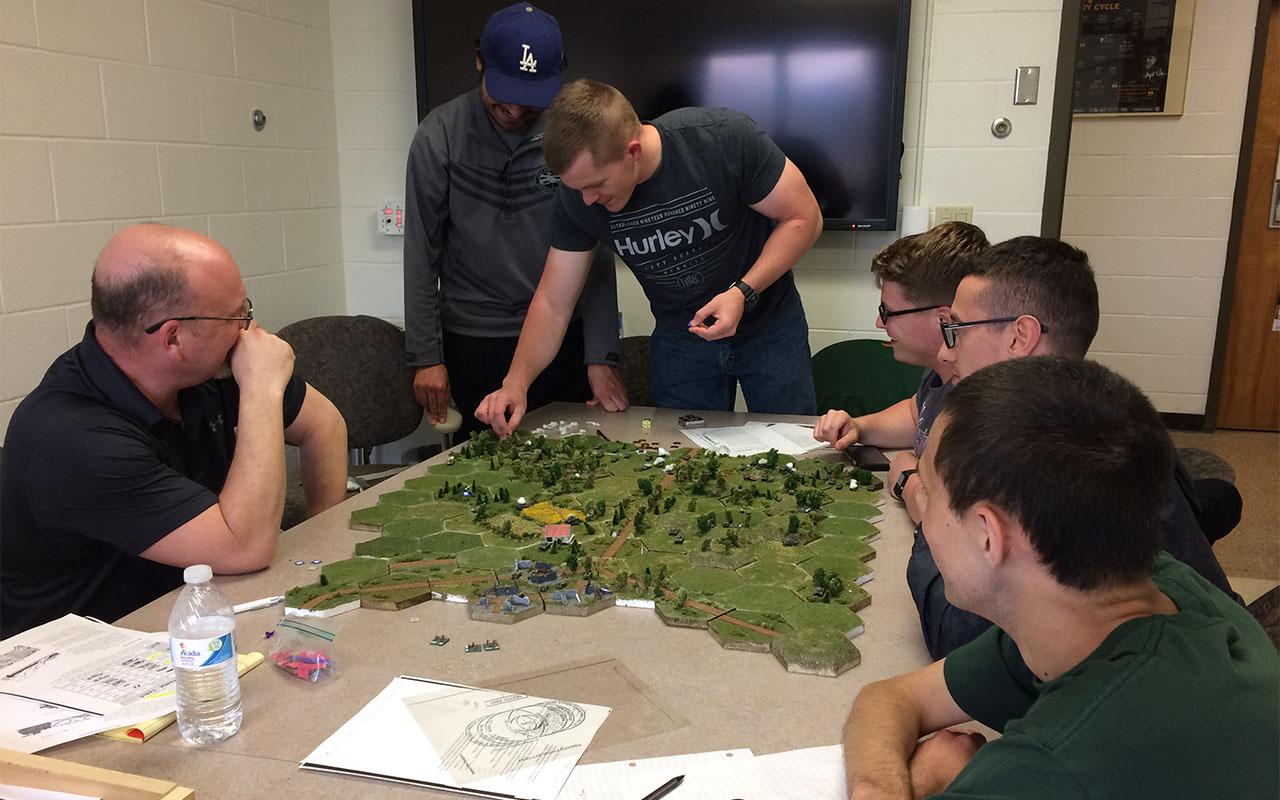
-
Why did you pick Latin American History?
I first became interested in this part of the world when I was in the military. When I was stationed at Fort Bragg, our unit focused on Nicaragua. When I got out of the service, I wanted to find out why we were so interested in this region and this country in particular. It led me to study with Dr. John Coatsworth and Dr. Friedrich Katz at the University of Chicago. Both gave me an extremely strong background in Latin American history that I have tried to apply since.
-
Tell us about your Kutztown University teaching experiences.
It has run the gamut. I have managed to teach students who have moved on to successful careers in academe and finished doctorates. I am absolutely convinced that the best and brightest of students at KU can compete and succeed against any school in the country. My Holy Grail has been defined by finding a way to motivate students in that direction.
-
What is your teaching philosophy?
I think it is really important to find a way to cultivate a student’s curiosity. Rather than simply talk at a class, I think it is also very important to engage with them. After doing this for 27 years, I always like to ask myself what I have learned after teaching a course. That is a lifelong project.
-
How have your personal experiences affected your teaching?
I think it is important for any teacher to find a way to bring his or her topic to life. I've used any number of personal anecdotes to try to best illustrate what I am talking about. That includes time spent roofing houses as well as one deployment to Iraq in 2006.
-
Why a class on conspiracies?
Because everyone has a favorite conspiracy. This class became an unexpected new stage in my career. I do sincerely believe that it is incredibly important for students to understand the difference between fact and fiction not just as an academic exercise but with respect to their basic citizenship. Contemporary events reinforce this conviction nearly every day.
DR. JOHN STANLEY - EAST ASIAN STUDIES
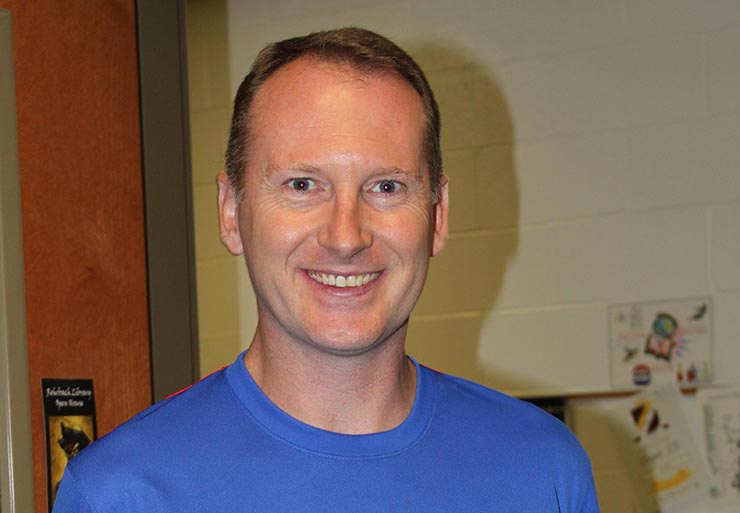
-
Tell us about your Kutztown University teaching experience...
Teaching at KU has certainly been a great experience over the last 16 years! I particularly like getting to know all of the students even if their main interest is not East Asia. My general goal at KU is to increase the students' understanding of East Asia, especially the secondary education students who will be teaching it to a wider section of society.
-
What originally piqued your interest in East Asian studies?
My real interest in East Asia came in the summer of 1991 when I attended a dedication ceremony at the site of a WWII Japanese internment camp. It was there that I first really learned of my family's connection with China that goes all the way back to the 1860s when my great-great-grandfather arrived in Tianjin. I later did my dissertation on the camp and have begun looking closer at the history of my family in North China where they lived and worked until 1945.
-
Your education included studies at Moravian College and the University of London, tell us about that...
My undergraduate experience at Moravian College was quite interesting with it being a small liberal arts school. I was always impressed with the faculty expertise and took as many classes in non-western history as I could. I added an interest in politics with a minor focusing on law (I took both sections of constitutional law). My graduate experience was much like my UG as SOAS (School of Oriental and African Studies) is a small research center focused on Asian and African studies within the larger University of London system. Being in the middle of London (the school was just off Russell Square) provided a unique experience with easy walks to Tower Bridge and other sites around the city.
-
What hobbies are you interested in?
One of my current hobbies is collecting genealogical information that I plan to distribute to the rest of the family. I also enjoy skiing and have started taking up golf. I still hit a killer slice into the woods but I'm getting better.
DR. CHRIS SAIDI - AFRICAN STUDIES
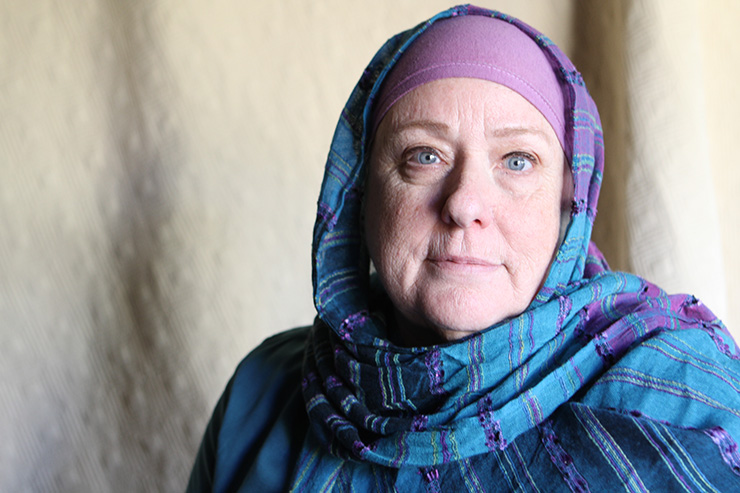
-
What caused you to specialize in African History?
I took a course at UCLA on early South African history taught by Dr. Christopher Ehret and I was hooked!
-
Geographically, how much of the world have you seen?
I lived for a year each in Seoul, South Korea; Rome, Italy and Zambia. I have visited far more places including, Japan, Somalia, Kenya, Democratic Republic of Congo, France, England, Belgium, and the Netherlands. Make sure that you take the time to explore too!
-
Why do you encourage KU students to attend grad school after completing their degree?
If you really have a passion for a subject, grad school will be the best and most wonderful time of your life. You live and breathe the subject; you make friends for life who care about the same subject.
-
What jobs did you hold before becoming a professor?
I was a grinder and deburrer in a steel factory. I worked as a payroll clerk in the insurance industry; I worked in garment factories (the worst was making bathing suits); delivering mail; as a performance artist and installation artist; taught poetry at Beyond Baroque; and was a bookkeeper for several companies. I worked my way through higher education and became a professor in academia later in life.
-
What is matrilineality?
Matrilineality is when your identity and inheritance is from your mother exclusively. In these societies, especially in Africa, authority and status are determined by age not biological sex. To marry, a young man must agree to work for his mother-in-law for years before the marriage is sanctioned. This means that older women often control much of the labor in an African matrilinieal community. But most matrilineal societies foster an attitude of gender equity. If you want to know more -- take a class with me!!
-
What do you want KU students to know about the possibilities of life?
If you put the effort in - you will be successful. I started out as a 23-year-old single mom of two, who worked all day and went to community college at night. I struggled a lot to achieve my education. But for me, it was worth it! I love doing research on early African history and teaching students about Africa.
-
You often greet people by saying, "Assalamu Alaikum." What does that translate to?
"May peace be with you."
DR. Michael Gabriel - Early American History
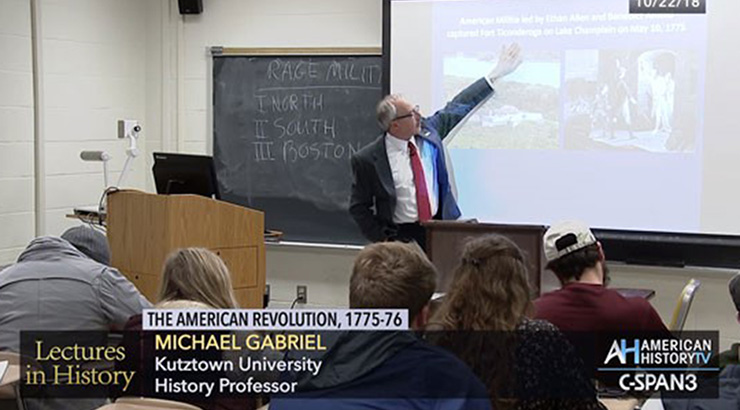
-
Q: History or Biology…?
“I received my B.S. in Biology at Clarion University. I was interested in history originally, but I thought biology was a better track to employment. A lot of my family members are in the medical field, so it made sense to follow that career path. Once I went to Syracuse University for graduate school, I realized that I did not want to be in the medical field. I still found myself wanting to go back to history, so I decided to pursue my passion despite my original hesitations. Then, I received my master’s degree in history at St. Bonaventure University, and I went to Penn State for my Ph.D.
-
Q: How did your teaching career begin?
My first teaching job was at St. Bonaventure right after grad school. I also taught at Jamestown Community College, Gettysburg College, and Penn State before I began teaching at Kutztown University.”
-
Q: How did you choose teaching in Kutztown?
“I was teaching at the University of Pittsburgh-Bradford while writing my dissertation at Penn State when a one-year temporary position opened at KU. I actually had a connection to KU through someone from Penn State. I taught as a temporary for two years, and then I was hired for the tenure track. I have been at Kutztown since 1994.”
-
Q: What are some of your greatest academic accomplishments?
“I received the David Library of the American Revolution Research Fellowship while researching pension records for the Battle of Bennington. I also received the Arthur and Isabel Wiesenberger Faculty Award for Excellence in Teaching in 2006 which is given by alumni at KU. I have four published works. My fourth book is coming out this July. I have a couple of American Revolution book projects coming up as well.”
-
Q: Is there anything you would like the students to know?
“I want students to know that it is okay to change your mind. You do not have to have your whole life planned out. Do not stick with a career path that you hate. I ended up pursuing my passion for history, and everything worked out. I am glad that I chose history because I am doing what I love. I think Kutztown is a good place to be!”
-
Q: Can you tell us about the kind of classes that you teach?
“I specialize in Early American History (pre-1865). In the past, I’ve taught a Western Civilization course. I also teach a public history course that provides information on history professions that do not involve teaching. I teach senior seminar as well.”
DR. ROBERT REYNOLDS - PA HISTORY, ENVIRONMENTAL & MORE
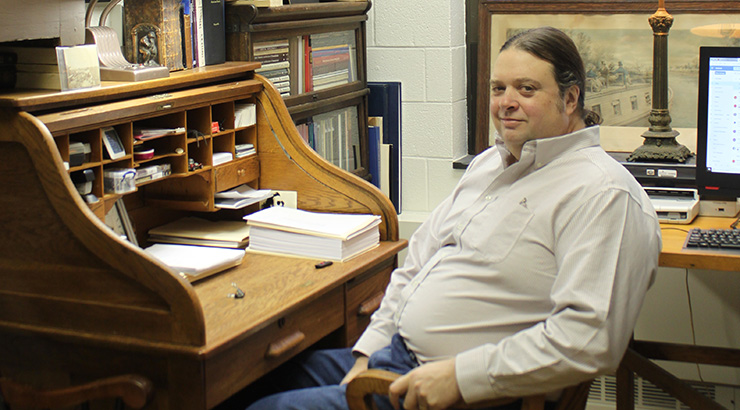
-
Q: What made you want to become a professor?
“I didn’t think about becoming a professor at first. I worked as a restoration artisan for the park service. Eventually, my job wanted me to work in Maine rather than New Jersey, but I needed to stay in one place since I was getting married. After that, I helped start a preservation program at Bucks County Community College, and that drew me in as a part-time teacher. The school liked me so I started teaching full-time. That is when I went back to school to get my doctorate.”
-
Q: Why did you pick history as your field?
“I have always been interested in history, even as a child. I was especially drawn to history because of my grandparents. They were very interested in genealogy. My grandmother on my father’s side is related to Daniel Webster. I was also drawn to history due to my experiences as a restoration artisan.”
-
Q: Did you have any other professions before teaching?
“I first went to Gettysburg College, and I fell in love with the battlefield and the landscape of the place. I loved the idea that the landscape could still reflect the Civil War so many years later.
Ultimately, I ended up pursuing the preservation and study of landscape and the vernacular architecture. It was my senior year of college when I found a brochure to become an apprentice for the National Trust for historic preservation. I filled it out, and I was hired a week later. That is what started it all. The job provided me with free housing so I ended up living in Lyndhurst Mansion which is the finest gothic revival house in America. I lived there for about a year and I worked on the restoration of the house along with a lot of other projects.
While I was doing that I got an offer from the park service which was closer to where I grew up in New Jersey. I ended up being a carpenter’s helper for the National Park Service, and I let go of my job with the National Trust. During my work for the National Park Service, I worked on a farmhouse from the 1750s which is called the Tempe Wick House. After that, I got transferred to work on the restoration of Thomas Edison’s house for about a year. The highlight of that experience was when the last surviving child of Thomas Edison, Theodore Edison, came to the house for a tour. He told me stories about growing up in the house.
Then, I decided that I really liked historic preservation so I ended up going to the University of Vermont. It was an incredible experience because the focus was on vernacular architecture and I got an internship with the State Preservation Office of New York in Albany. I studied Dutch barns for a whole summer. I ended up in Pennsylvania because I got a job at the Buck’s County Conservancy. I was there for two and half years and I photographed 27,000 buildings doing historic site survey work for the state. I would go township by township, and I photographed every building fifty years or older within the area. I really enjoyed going to farms and talking to the oldest people that I met there. They had lived there their whole lives and knew the history of the whole area around them. I could spend the whole day there because I was learning so much about Pennsylvania architecture. I realized that I wasn’t going to grow with this job after a certain point.
Then, I was offered a job to teach an American architecture class at the Bucks County Community College. It made it practical for me to go to graduate school. I went to Lehigh University, and I ended up getting a teaching assistantship there. When I finished my dissertation, I got hired by Penn State Hazelton as an adjunct professor. After that, I saw an advertisement for Kutztown and I came here in 2003. I shared an office with Dave Valeska and he ran the Pennsylvania German Heritage Center. He let me take over the position. I worked there for a few years while also teaching art education classes before I went back to teaching history full-time for the department.”
-
Q: Are there any stories behind the retro furniture in your office?
“I like to collect antique boats, cars, and furniture. As for the furniture in my office, I wanted to be in an office that I actually wanted to spend time in so I filled my office with things that I like. My bookcases are from my wife’s grandfather who was a doctor from the ’20s.”
-
Q: Can you tell us about the book that you are writing?
“Once I was teaching full-time again for the history department, I started working on my book. I am now getting to the end of finishing my first major book.
I grew up going to Beaver Lake during my summers. It is a summer community that encourages people to step away from technology, and to enjoy the outdoors. I wondered if there were other summer communities like Beaver Lake. That inspired me to pursue research about summer communities. There was actually a whole social movement at the turn of the century for middle-class people to escape city life part-time. By escaping city life part-time, people can recharge themselves and can become more successful when they go back to work. My book has a focus on the national movement, the community that I grew up in, and how the area around my community grew from the Civil War up to the 1950s.
My lake was an experimental summer colony. It was by invitation only, and the homes typically stay within families. It is really fascinating because all of my sources are from private archives and records. I have been working on this book for over 40 years. I started interviewing people in my summer community as a young teenager. This has been a huge project for me, but I am almost done drafting it.”
-
Q: What is your favorite part about being a history professor at Kutztown?
“My favorite part is watching students succeed and grow. I enjoy helping students improve upon their writing. I also like how teaching has a fresh start every semester. I like that I get to pursue my other passions when I am not teaching.”
Dr. Patricia Kelleher - American Social History
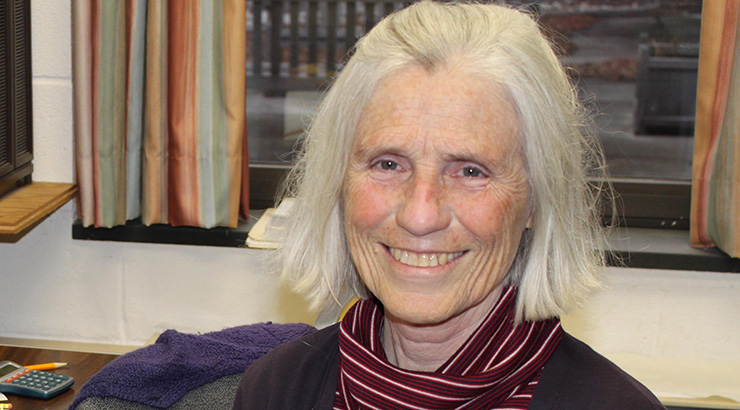
-
Q: What inspired you to become a professor?
“I was really interested in history and back then, people taught if they wanted history as their profession. Now, there is a much wider range of professions for people with history degrees. I went to the University of Wisconsin-Madison for my Ph.D. and I was able to do a lot of research which was really fun. Once I started teaching as an adjunct, I found that I love to teach.”
-
Q: How did you end up teaching at Kutztown?
“I stayed at the University of Wisconsin-Madison for over 20 years. I was an adjunct professor for the women studies program, and then I went back to teaching history. After that, I went to the University of New Hampshire for a three-year job. Then, I saw an ad for Kutztown University and it became my first tenure job.”
-
Q: What made you choose history?
“My parents, but especially my father was interested in history. My house was full of books, and I loved to read. My parents really tried to help me find my talent. I tried ballet, swimming, piano lessons, but I was much more interested in reading. I found that the more I read about history, the more I wanted to learn about history. By 7th or 8th grade, I was extremely fascinated with history.”
-
Q: What is your favorite area?
“It changes all the time. Right now, I am most interested in gender studies. I love teaching all of my classes because they are so different from one another. However, I am really drawn to my Families and Personal Lives in American History course at the moment because it is only my second time teaching this course. It’s a new challenge that I am really enjoying.”
-
Q: Do you have a teaching philosophy?
“I think that my philosophy of teaching is centered around students thinking for themselves. I want students to work on their own views by basing their analyses on creditable evidence. I want students to respect themselves by coming up with their own answers to inquiries.”
-
Q: What is your favorite part about being a history professor at KU?
“My favorite part is definitely the teaching aspect. This year, in particular, I have found that I also enjoy learning about new courses for the university. I am on the Liberal Arts and Sciences Curriculum Committee, and so I see the course proposals that are generated in this college’s departments. It is fun to see professors put together courses in ways that I wouldn’t have thought of. I have really grown in respect for what goes on across the college. There are some truly thoughtful and amazing course proposals. We have fantastic faculty members that are putting together remarkable courses.”






